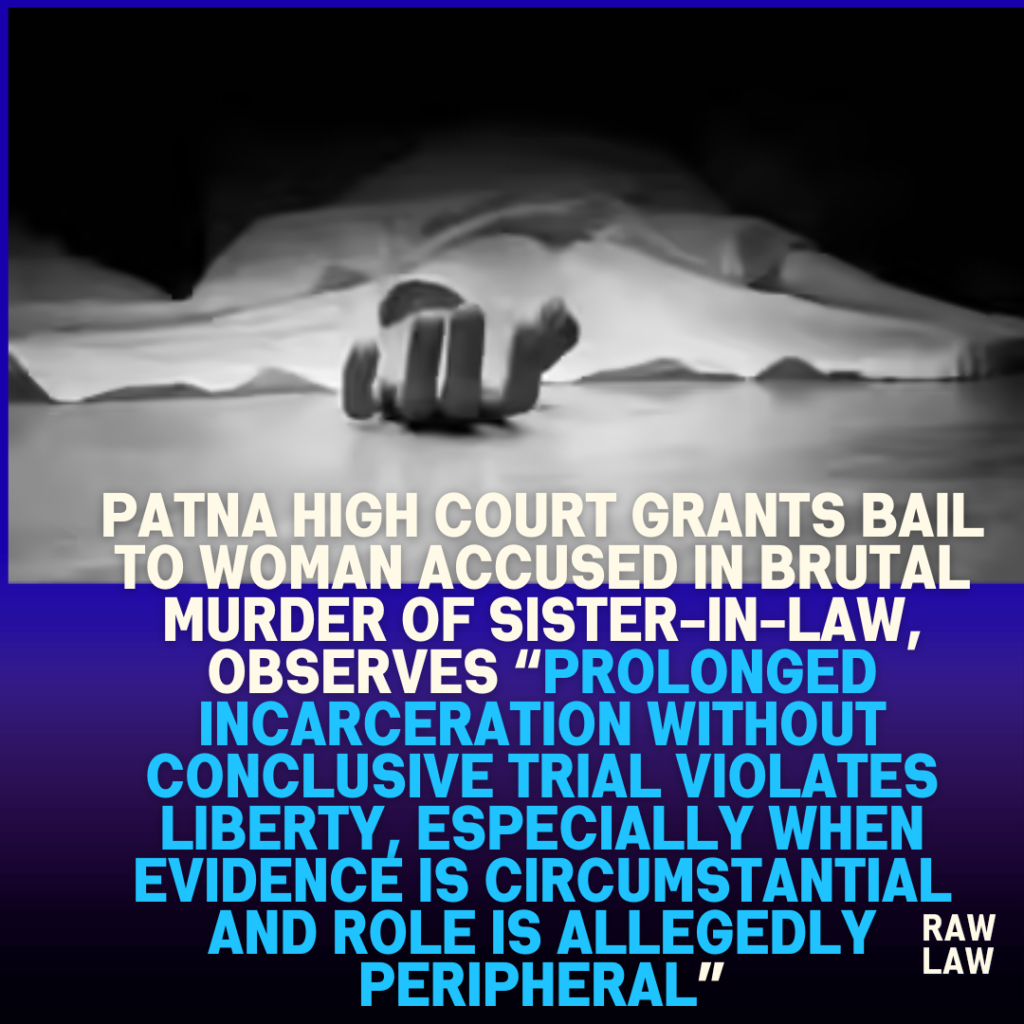Court’s Decision
The Patna High Court granted bail to the petitioner, a woman accused of murdering her sister-in-law. She had been in custody for over two years. The Court noted that the evidence against her was largely circumstantial and that she was not the principal accused. Moreover, the trial was yet to conclude and her continued incarceration without a timely conclusion of proceedings violated her fundamental rights under Article 21. The Court ordered her release on bail with suitable conditions.
Facts
The petitioner was accused of being part of a brutal murder conspiracy involving the death of her sister-in-law, who was allegedly hanged after being killed and the crime disguised as suicide. The FIR alleged that multiple family members, including the petitioner, were complicit in the murder due to longstanding domestic disputes. The petitioner had been in custody for more than two years, and the trial was still pending. She filed a bail application citing prolonged incarceration, her peripheral role, and absence of direct evidence against her.
Issues
- Whether the petitioner is entitled to bail in a murder case where she is not the principal accused and has been in custody for over two years?
- Whether prolonged incarceration without conclusion of trial infringes upon the fundamental right to life and liberty?
Petitioner’s Arguments
The petitioner argued that:
- She is a woman with no prior criminal antecedents and has been falsely implicated due to family enmity.
- She had no active role in the alleged incident and was not present at the scene of crime.
- The primary allegation is against her husband and other male relatives.
- The case is based on circumstantial evidence and lacks any direct attribution of violence to her.
- She has been in custody for over two years without any significant progress in trial.
- Her right to liberty under Article 21 of the Constitution is being violated.
Respondent’s Arguments
The prosecution opposed the bail on grounds that:
- The petitioner is one of the co-accused in a heinous offence of murder.
- The investigation revealed that the act was premeditated and involved multiple family members.
- Releasing her on bail might lead to tampering with evidence or influencing witnesses.
- The nature and gravity of the offence should deter the court from exercising bail discretion.
Analysis of the Law
The Court referred to the constitutional mandate under Article 21 guaranteeing the right to personal liberty. It acknowledged that:
- Bail should not be denied merely due to the seriousness of the allegation if the role of the accused is minimal and trial is protracted.
- Courts must consider the period of custody, status of trial, and extent of involvement of the accused while adjudicating bail applications.
Further, the Court reiterated that in cases based on circumstantial evidence, unless the chain of circumstances is complete and unbroken against the accused, bail can be considered.
Precedent Analysis
The Court did not directly cite prior judgments, but its reasoning aligned with settled principles in the following cases:
- Supreme Court in Sanjay Chandra v. CBI (2012) – Bail should not be denied merely because of the offence being grave.
- Hussain v. Union of India (2017) – Emphasised the importance of speedy trial and upheld the right to bail when delay occurs.
These decisions informed the Court’s emphasis on personal liberty, especially when trial is not concluded within a reasonable time.
Court’s Reasoning
The Court considered the following:
- The petitioner had already undergone over two years in custody.
- The evidence was largely circumstantial, and her role was not central.
- Delay in conclusion of trial without strong justification cannot justify indefinite incarceration.
- Bail conditions could mitigate any risk of tampering or absconding.
Accordingly, the Court concluded that continued detention would be unjustified in the facts of the case.
“Liberty cannot be held ransom to procedural delays, especially when the accused is a woman, has remained in custody for over two years, and the evidence is not conclusively direct.”
Conclusion
The petitioner was granted bail subject to furnishing a bail bond of ₹25,000 with two sureties of the like amount. She was directed to cooperate in the trial and not attempt to influence any witness or tamper with evidence. The Court observed that the bail was granted purely on the basis of prolonged incarceration and peripheral role, and would not be treated as a precedent on merits.
Implications
- The judgment strengthens the jurisprudence around bail for women in prolonged pre-trial detention.
- Reiterates that peripheral role and circumstantial evidence alone do not justify indefinite imprisonment.
- Underscores the need to balance the right to liberty with the seriousness of allegations, particularly when trials are delayed.
Cases Referred and Their Relevance
Though no precedents are explicitly cited, the decision aligns with:
- Sanjay Chandra v. CBI (2012) – Bail as the norm, even in economic or serious crimes, when incarceration is prolonged.
- Hussain v. Union of India (2017) – Right to speedy trial as a fundamental right.
FAQs
1. Can bail be granted in murder cases if the accused is not the main perpetrator?
Yes. Courts consider the role of the accused, the nature of evidence, and time spent in custody when deciding bail even in murder cases.
2. Does prolonged trial justify granting bail?
Yes. As per Article 21, an accused cannot be detained indefinitely if trial is not concluded within a reasonable period.
3. Is circumstantial evidence enough to deny bail?
Not always. If the chain of circumstances is incomplete or weak, and the accused has a limited role, bail can be granted.
